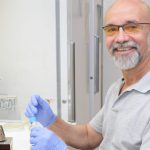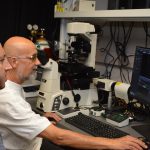Jonathan D. Wren, Ph.D.
Professor
Genes & Human Disease Research Program
Adjunct Associate Professor, Departments of Biochemistry & Molecular Biology and Geriatric Medicine, University of Oklahoma Health Sciences Center
Associate Member, Stephenson Cancer Center, OUHSC
My 101
In biology and medicine, not only has a lot of data already been generated, but technological advances are enabling us to gather more of it faster every year. Having a lot of data, however, does not necessarily mean we have any greater understanding of how things work.
Discovering how diseases begin and how they might be treated comes from putting the data in a context that it can be understood and then putting the data in the right hands to use it. One example of this is human genetics. Humans have about 25,000 protein-coding genes, and we have data on the location of each gene, but we still don’t know what about one-third of them do.
In my lab, we focus on using computers to make sense of the “data deluge” by finding patterns within large databases and using different sources of information to identify and experimentally verify causal relationships buried within the data. For example, we developed a method to predict what this remaining third of unknown genes do. And, with collaborators, we have been able to validate these predictions experimentally, identifying novel genes that play important roles in immune cell movement and function, blood vessel growth, cancer progression, DNA repair and cell division.
Now, recent technological advances in Artificial Intelligence are helping us accelerate our understanding of the patterns that exist across all experiments. Our goal is to push the boundaries of what we know about human genetics and disease using computational approaches, making inroads into this “Final Third” of our genome and understanding the contribution our genes make to both health and disease.
Research
Many scientific questions can be answered with data that already exists. My lab’s goal is to develop methods to accelerate the pace of scientific discovery.
My area of research is in bioinformatics, which uses computational approaches to solve biomedical problems. Generally, my research interests are in developing computational methods to accelerate our movement from data (observations and measurements) to knowledge (predicting cause and effect). Individual case-control experiments are the backbone of the traditional scientific method, but they lack broader context, such as how unique those changes are to the disease being studied. “What has changed?” is an easier question to answer than “How certain are we these changes are real (i.e., reproducible)?” which, in turn, is easier than “What do these changes mean?”. Modern scientific technologies generate tremendous amounts of data, allowing us to contrast new experiments with prior ones, but this comes with challenges.
One arm of my research is data mining. We are interested in integrating and data mining large biomedical databases, like repositories from the National Center for Biotechnology Information, for patterns that can help science accelerate its knowledge regarding the genetic and epigenetic causes that lead to the onset and progression of diseases. Humans have approximately 25,000 protein-coding genes, and we don’t know the functions of about 33% of them. If we add the 30,000 non-coding RNA to this total, approximately 55% are of unknown function. For genes we know something about, the amount of information per gene is often skewed toward those of commercial importance. Emerging data indicates that many, if not most, of these uncharacterized genes are just as important, biologically speaking, as the ones we do know about. We are working on methods of structuring this data using large language models like ChatGPT in combination with vector databases to store and analyze it with artificial intelligence and machine learning methods.
The second arm of my research is developing methods to automate error-checking, both in the scientific literature and public data. Scientific literature is growing exponentially, both in the number of papers published and the size of the papers. Our current peer-review model is being challenged because literature production is outpacing the number of scientists available to review papers, which is only growing linearly. My studies have shown that certain errors and even ethical breaches are slipping by peer review at a fairly constant rate. Fortunately, we can catch some algorithmically. We have included only a few in a prototype web server to check scientific papers at http://pubqc.omrf.org, which we are working to expand to help increase the quality of published science.
Brief CV
Education
B.B.A., University of Oklahoma, 1991
B.S., University of Oklahoma, 1996
Ph.D., University of Texas Southwestern Medical Center, 2003
Honors and Awards
NIH Institutional Training Grant Award in Genomic Science, 1999
Scientific Advisory Board, eTexx Biopharmaceuticals, Inc., 2003-present
Board of Directors, MCBIOS, 2003-2014
President, Oklahoma Bioinformatics Society (OKBIOS), 2004-2008
President, MidSouth Bioinformatics Society (MCBIOS), 2007-2008
MCBIOS Outstanding Service Award, 2011, 2019
Associate Editor, Bioinformatics, 2005-2026
Other Activities
Ad hoc reviewer for numerous scientific journals; co-organizer and participant for our campus-wide Data Science Workshop series; grant reviewer NIH & NSF bioinformatics grants
Memberships
International Society for Computational Biology, 1998-present
Mid-South Computational Biology and Bioinformatics Society, 2003-present
Joined OMRF scientific staff in 2007
Publications
Recent Publications
Burge KY, Georgescu C, Zhong H, Wilson AP, Gunasekaran A, Yu Z, Franca A, Eckert JV, Wren JD, Chaaban H. Spatial transcriptomics delineates potential differences in intestinal phenotypes of cardiac and classical necrotizing enterocolitis. iScience 28:112166, 2025 March, PMID: 40201118, PMCID: PMC11978348
Scofield RH, Wren JD, Lewis VM. The toll like receptor 7 pathway and the sex bias of systemic lupus erythematosus. Front Immunol 16:1479814, 2025 February, PMID: 40051623, PMCID: PMC11882868
Zhu Y, Tchkonia T, Pirtskhalava T, Gower AC, Ding H, Giorgadze N, Palmer AK, Ikeno Y, Hubbard GB, Lenburg M, O'Hara SP, LaRusso NF, Miller JD, Roos CM, Verzosa GC, LeBrasseur NK, Wren JD, Farr JN, Khosla S, Stout MB, McGowan SJ, Fuhrmann-Stroissnigg H, Gurkar AU, Zhao J, Colangelo D, Dorronsoro A, Ling YY, Barghouthy AS, Navarro DC, Sano T, Robbins PD, Niedernhofer LJ, Kirkland JL. The Achilles' heel of senescent cells: from transcriptome to senolytic drugs. Aging Cell 14:644-58, 2015 August, PMID: 25754370, PMCID: PMC4531078
Selected Publications
Buckley DA, Jennings EM, Burke NN, Roche M, McInerney V, Wren JD, Finn DP, McHugh PC. Erratum to: The Development of Translational Biomarkers as a Tool for Improving the Understanding, Diagnosis and Treatment of Chronic Neuropathic Pain. Mol Neurobiol. 2017 Jul 1. PMID: 28669124 PMCID: PMC4960984
Siefert JC, Georgescu C, Wren JD, Koren A, Sansam CL. DNA replication timing during development anticipates transcriptional programs and parallels enhancer activation. Genome Res. 2017 May 16. pii: gr.218602.116. PMID: 28512193 PMCID: PMC5538556
Unnikrishnan A, Jackson J, Matyi SA, Hadad N, Wronowski B, Georgescu C, Garrett KP, Wren JD, Freeman WM, Richardson A. Role of DNA methylation in the dietary restriction mediated cellular memory. Geroscience. 2017 May 5. PMID: 28477138 PMCID: PMC5505897
Ziegler J, Pody R, Coutinho de Souza P, Evans B, Saunders D, Smith N, Mallory S, Njoku C, Dong Y, Chen H, Dong J, Lerner M, Mian O, Tummala S, Battiste J, Fung KM, Wren JD, Towner RA. ELTD1, an effective anti-angiogenic target for gliomas: preclinical assessment in mouse GL261 and human G55 xenograft glioma models. Neuro Oncol. 2017 Feb 1;19(2):175-185. PMID: 27416955 PMCID: PMC5464087
Kushwaha G, Dozmorov M, Wren JD, Qiu J, Shi H, Xu D. Hypomethylation coordinates antagonistically with hypermethylation in cancer development: a case study of leukemia. Hum Genomics. 2016 Jul 25;10 Suppl 2:18. PMID: 27461342 PMCID: PMC4965721
Hadad N, Masser DR, Logan S, Wronowski B, Mangold CA, Clark N, Otalora L, Unnikrishnan A, Ford MM, Giles CB, Wren JD, Richardson A, Sonntag WE, Stanford DR, Freeman W. Absence of genomic hypomethylation or regulation of cytosine-modifying enzymes with aging in male and female mice. Epigenetics Chromatin. 2016 Jul 13;9:30. eCollection 2016. PMID: 27413395 PMCID: PMC4942942
Contact
Genes & Human Disease Research Program, MS 42
Oklahoma Medical Research Foundation
825 N.E. 13th Street
Oklahoma City, OK 73104
Phone: (405) 271-6989
Fax: (405) 271-4110
E-mail: Jonathan-Wren@omrf.org
For media inquiries, please contact OMRF’s Office of Public Affairs at news@omrf.org.
Lab Staff
Constantin Georgescu, Ph.D.
Staff Scientist
Cory Giles, Ph.D.
Bioinformatics Scientist
Hunter Porter, Ph.D.
Postdoctoral Scientist
Susan "Suzy" Collins
Project Coordinator II
News from the Wren lab

The National Institutes of Health has awarded two grants worth a total of $26.3 million to OMRF for research into anthrax and to help train new scientists. Each grant will allow scientists to continue research started in 2004 and 2005 and keep them working through 2014 on several interconnected projects. In the first project, a $14.5 […]
Much like the world of college essays, scientific journals are often plagued with authors trying to publish someone else’s work as their own. For Oklahoma Medical Research Foundation scientist Jonathan Wren, Ph.D., the issue hit home as part of his duties as an editor for the journal Bioinformatics, when a reviewer recognized a paper as […]
Rare is the scientific paper today written by a single author. With research being conducted by teams of scientists, most studies now boast a half-dozen or so authors. According to a new study led by a scientist at the Oklahoma Medical Research Foundation, credit for those papers is far from evenly distributed, and the order […]
The Oklahoma Medical Research Foundation today announced the addition of four scientists to the faculty of its Arthritis & Immunology Research Program. The four new faculty members are Patrick Gaffney, M.D., Kathy Moser, Ph.D., Jonathan Wren, Ph.D., and Igor Dozmorov, Ph.D. “Their recruitment gives us a depth of scientific commitment and expertise that is unparalleled […]





















